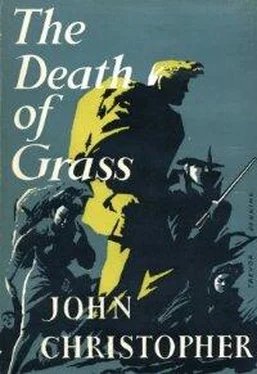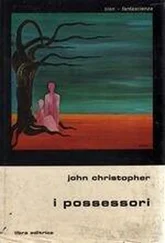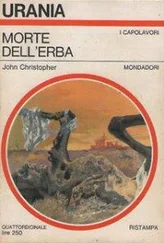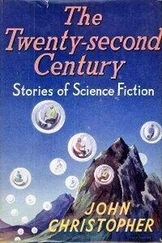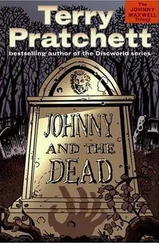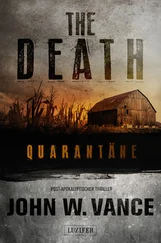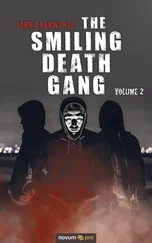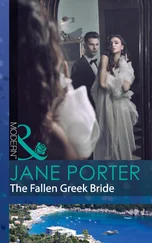“I can’t tell you yet. But we’re leaving London.”
“Today? Then I shan’t go back to school tonight?” He made no answer. “Is it something dreadful?”
“Dreadful enough. We’re going to live in the valley. Will you like that?”
She smiled. “I wouldn’t call it dreadful.”
“The dreadful part,” he said slowly, “will be for other people.”
They reached home soon after two. As they walked up the garden path, Ann opened the door for them. She looked tense and unhappy. John put an arm around her.
“Stage one completed without mishap. Everything’s going well, darling. Nothing to worry about. Roger and the others not here?”
“It’s his car. Cylinder block cracked, or something. He’s round at the garage, hurrying them up. They’re all coming over as soon as possible.”
“Has he any idea how long?” John asked sharply.
“Shouldn’t be more than an hour.”
Mary asked: “Are the Buckleys coming with us? What’s happening?”
Ann said: “Run up to your room, darling. I’ve packed your things for you, but I’ve left just a little space for anything which I’ve left out which you think is specially important. But you will have to be very discriminating. It’s only a very little space.”
“How long are we going for?”
Ann said: “A long time, perhaps. In fact, you might as well act as though we were never coming back.”
Mary looked at them for a moment. Then she said gravely:
“What about Davey’s things? Shall I look through those as well?”
“Yes, darling,” Ann said. “See if there’s anything important I’ve missed.”
When Mary had gone upstairs, Ann clung to her husband.
“John, it can’t be true!”
“Roger told you the whole story?”
“Yes. But they couldn’t do it. They couldn’t possibly.”
“Couldn’t they? I’ve just told Miss Errington I shall be bringing Mary back this evening. Knowing what I know, is there very much difference?”
Ann was silent. Then she said:
“Before all this is over … are we going to hate ourselves? Or are we just going to get used to things, so that we don’t realize what we’re turning into?”
John said: “I don’t know. I don’t know anything, except that we’ve got to save ourselves and save the children.”
“Save them for what?”
“We can work that out later. Things seem brutal now—leaving without saying a word to all the others who don’t know what’s going to happen—but we can’t help it. When we get to the valley, it will be different We shall have a chance of living decently again.”
“Decently?”
Things will be hard, but it may not be a bad life. It will be up to us what we make of it At least, we shall be our own masters. It will no longer be a matter of living on the sufferance of a State that cheats and bullies and swindles its citizens and, at last, when they become a burden, murders them.”
“No, I suppose not.”
“Bastards!” Roger said. “I paid them double for a rush job, and then had to hang around for three-quarters of an hour while they looked for their tools.”
It was four o’clock. Ann said:
“Have we time for a cup of tea? I was just going to put the kettle on.”
Theoretically,” Roger said, “we’ve got all the time in the world. All the same, I think we’ll skip the tea. There’s an atmosphere about—uneasiness. There must have been some other leaks, and I wonder just how many. Anyway, I shall feel a lot happier when we’re clear of London.”
Ann nodded. “All right.” She walked through to the kitchen. John called after her:
“Anything I can get for you?”
Ann looked back. “I left the kettle full of water. I was just going to put it away.”
That’s our hope,” Roger said. “The feminine stabilizer. She’s leaving her home for ever, but she puts the kettle away. A man would be more likely to kick it round the floor, and then set fire to the house.”
They pulled away from the Custances’ house with John’s car leading, and drove to the north. They were to follow the Great North Road to a point beyond Welwyn and then branch west in the direction of Davey’s school.
As they were passing through East Finchley, they heard the sound of Roger’s horn, and a moment later he accelerated past them and drew up just ahead. As they went past, Olivia, leaning out of the window, called:
“Radio!”
John switched on.
“… emphasized too strongly that there is no basis to any of the rumours that have been circulating. The entire situation is under control, and the country has ample stocks of food.”
The others walked back and stood by the car. Roger said:
“Someone’s worried.”
“Virus-free grain is being planted,” the voice continued, “in several parts of England, Wales, and Scotland, and there is every expectation of a late-autumn crop.”
“Planting in July!” John exclaimed.
“Stroke of genius,” Roger said. “When there’s a rumour of bad news, say that Fairy Godmother is on her way down the chimney. Plausibility doesn’t matter at a time like that.”
The announcer’s voiced changed slightly:
“It is the Government’s view that danger could only arise from panic in the population at large. As a measure towards preventing this, various temporary regulations have been promulgated, and come into force immediately.
The first of these deals with restrictions on movements. Travel between cities is temporarily forbidden. It is hoped that a system of priorities for essential movements will be ready by tomorrow, but the preliminary ban is absolute…”
Roger said: They’ve jumped the gun! Come on—let’s try and crash through. They may not be ready for us yet.”
The two cars drove north again, across the North Circular Road, and through North Finchley and Barnet The steady reassuring voice on the radio continued to drone out regulations, and then was followed by the music of a cinema organ {70} 70 cinema organ: in cinemas of the period (1950s) there was frequently an interlude in which an organist played music
. The streets showed their usual traffic, with people shopping or simply walking about There was no evidence of panic here in the outer suburbs. Trouble, if there were any, would have started in Central London.
They met the road block just beyond Wrotham Park. Barriers had been set up in the road; there were khaki-clad figures on the other side. The two cars halted. John and Roger went over to the road block. Already there were half a dozen motorists there, arguing with the officer in charge. Others, having abandoned the argument, were preparing to turn their cars and drive back.
“Ten bloody minutes!” Roger said. “We can’t have missed it by more; there would have been a much bigger pile-up.”
The officer was a pleasant, rather wide-eyed young fellow, clearly enjoying what he saw as an unusual kind of exercise.
“I’m very sorry,” he was saying, “but we’re simply carrying out orders. No travel out of London is permitted.”
The man who was at the front of the objectors, about fifty, heavily built and darkly Jewish in appearance, said:
“But my business is in Sheffield! I only drove down to London yesterday.”
“You’ll have to listen to the news on the wireless,” the officer said. They’re going to have some kind of arrangements for people like you.”
Roger said quietly: This is no go, Johnny. We couldn’t even bribe him with a mob like this around.”
The officer went on: “Don’t treat this as official, but I’ve been told the whole thing’s only a manoeuvre. They’re trying out panic precautions, just to be on the safe side. It will probably be called off in the morning.”
Читать дальше
